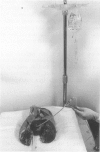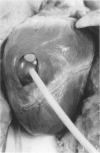Abstract
For a select group of patients with penetrating chest trauma, immediate thoracotomy in the accident and emergency department offers the only chance of survival. Foley catheters have been used to achieve haemostasis in cardiac wounds but are not widely used for intracardiac fluid and drug administration during resuscitation. In an anatomical model designed to assess this procedure an average flow rate of 275 ml min-1 was achieved. The equipment required is readily available and easily assembled.
Full text
PDF





Images in this article
Selected References
These references are in PubMed. This may not be the complete list of references from this article.
- Attard G. The use of the Foley catheter in the emergency room treatment of penetrating cardiac injuries. Injury. 1986 Jan;17(1):43–44. doi: 10.1016/0020-1383(86)90015-x. [DOI] [PubMed] [Google Scholar]
- Batey N. R., MacBain G. C. Injury by stabbing. Scott Med J. 1967 Jul;12(7):251–255. doi: 10.1177/003693306701200703. [DOI] [PubMed] [Google Scholar]
- Ivatury R. R., Rohman M. The injured heart. Surg Clin North Am. 1989 Feb;69(1):93–110. doi: 10.1016/s0039-6109(16)44738-9. [DOI] [PubMed] [Google Scholar]
- Mattox K. L. Indications for thoracotomy: deciding to operate. Surg Clin North Am. 1989 Feb;69(1):47–58. doi: 10.1016/s0039-6109(16)44734-1. [DOI] [PubMed] [Google Scholar]
- Samelson S. L., Robin A. P., Merlotti G. J., Lange D. A., Barrett J. A. A new method of rapid fluid resuscitation during thoracotomy performed in the emergency room. Surg Gynecol Obstet. 1987 Aug;165(2):175–176. [PubMed] [Google Scholar]
- Shamoun J. M., Barraza K. R., Jurkovich G. J., Salley R. K. In extremis use of staples for cardiorrhaphy in penetrating cardiac trauma: case report. J Trauma. 1989 Nov;29(11):1589–1591. doi: 10.1097/00005373-198911000-00021. [DOI] [PubMed] [Google Scholar]
- Swann I. J., MacMillan R., Watson A. A. A study of stab wounds. Arch Emerg Med. 1985 Mar;2(1):31–36. doi: 10.1136/emj.2.1.31. [DOI] [PMC free article] [PubMed] [Google Scholar]
- Trinkle J. K., Toon R. S., Franz J. L., Arom K. V., Grover F. L. Affairs of the wounded heart: penetrating cardiac wounds. J Trauma. 1979 Jun;19(6):467–472. doi: 10.1097/00005373-197906000-00009. [DOI] [PubMed] [Google Scholar]
- Walton C. B., Blaisdell F. W., Jordan R. G., Bodai B. I. The injury potential and lethality of stab wounds: a Folsom Prison Study. J Trauma. 1989 Jan;29(1):99–101. doi: 10.1097/00005373-198901000-00021. [DOI] [PubMed] [Google Scholar]
- Wilson S. M., Au F. C. In extremis use of a Foley catheter in a cardiac stab wound. J Trauma. 1986 Apr;26(4):400–402. doi: 10.1097/00005373-198604000-00017. [DOI] [PubMed] [Google Scholar]





